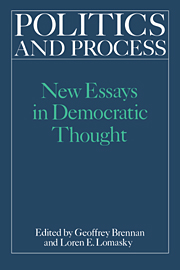Book contents
- Frontmatter
- Contents
- Acknowledgments
- List of contributors
- Introduction
- Chapter 1 The justification of democracy
- Chapter 2 Large numbers, small costs: the uneasy foundations of democratic rule
- Chapter 3 Evaluating the institutions of liberal democracy
- Chapter 4 Democracy: the public choice approach
- Chapter 5 The democratic order and public choice
- Chapter 6 Radical federalism: responsiveness, conflict, and efficiency
- Chapter 7 Contractarian presuppositions and democratic governance
- Chapter 8 In quest of the social contract
- Chapter 9 Rationality and the justification of democracy
- Chapter 10 The morality of democracy and the rule of law
- Index
Chapter 1 - The justification of democracy
Published online by Cambridge University Press: 29 September 2009
- Frontmatter
- Contents
- Acknowledgments
- List of contributors
- Introduction
- Chapter 1 The justification of democracy
- Chapter 2 Large numbers, small costs: the uneasy foundations of democratic rule
- Chapter 3 Evaluating the institutions of liberal democracy
- Chapter 4 Democracy: the public choice approach
- Chapter 5 The democratic order and public choice
- Chapter 6 Radical federalism: responsiveness, conflict, and efficiency
- Chapter 7 Contractarian presuppositions and democratic governance
- Chapter 8 In quest of the social contract
- Chapter 9 Rationality and the justification of democracy
- Chapter 10 The morality of democracy and the rule of law
- Index
Summary
Political justification and metaethics
How does one go about justifying a form of political ideals and a form of government? Moral philosophers are broadly in agreement. Those who support anarchism are exceedingly scarce. Some form of democracy enjoys a wide degree of support, as does the ban on slavery. So also does the requirement that people who drive automobiles observe rules calculated to facilitate the movement of traffic and to protect the safety of those using the highways. Yet if one ventures into the field of metaethics, it soon becomes apparent that agreement on principles of political ethics by no means implies agreement on the method of arriving at, and substantiating, those principles. On that point the doctors are in sharp disagreement, and James Fishkin, for example, finds this discord disturbing. The first step for one who would justify a form of government, he believes, is to select the proper “moral decision procedure.” Yet this is the very matter on which disagreement is rife. It is not just as a philosopher that this lack of agreement concerns him; he fears the practical consequences. From his own empirical studies he has concluded that the person in the street believes in moral absolutes.
- Type
- Chapter
- Information
- Politics and ProcessNew Essays in Democratic Thought, pp. 11 - 41Publisher: Cambridge University PressPrint publication year: 1989



